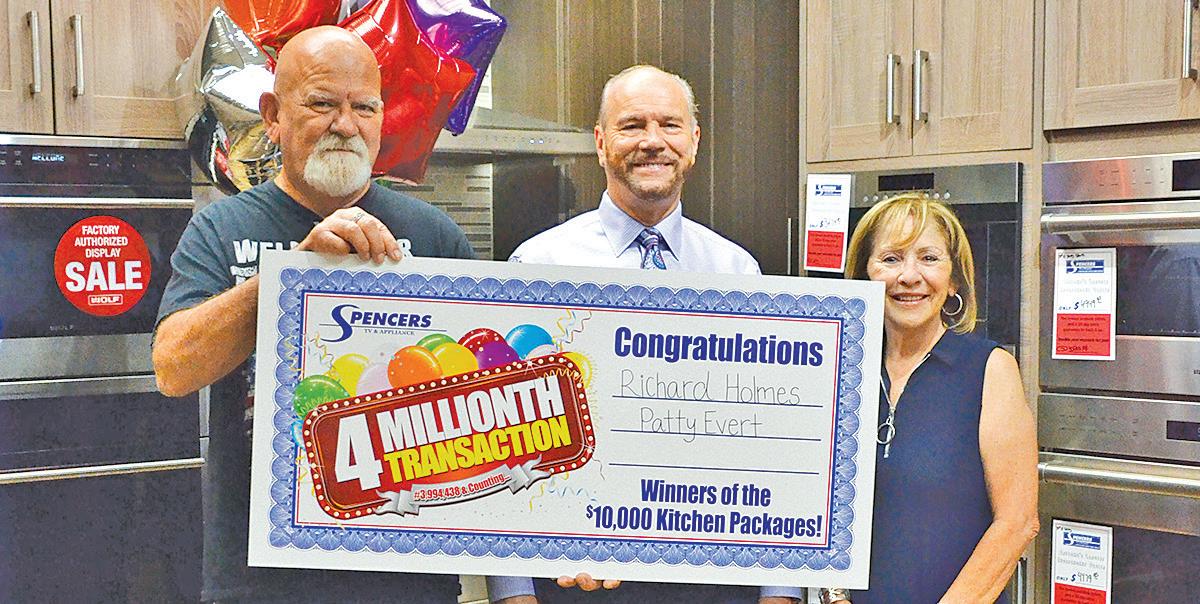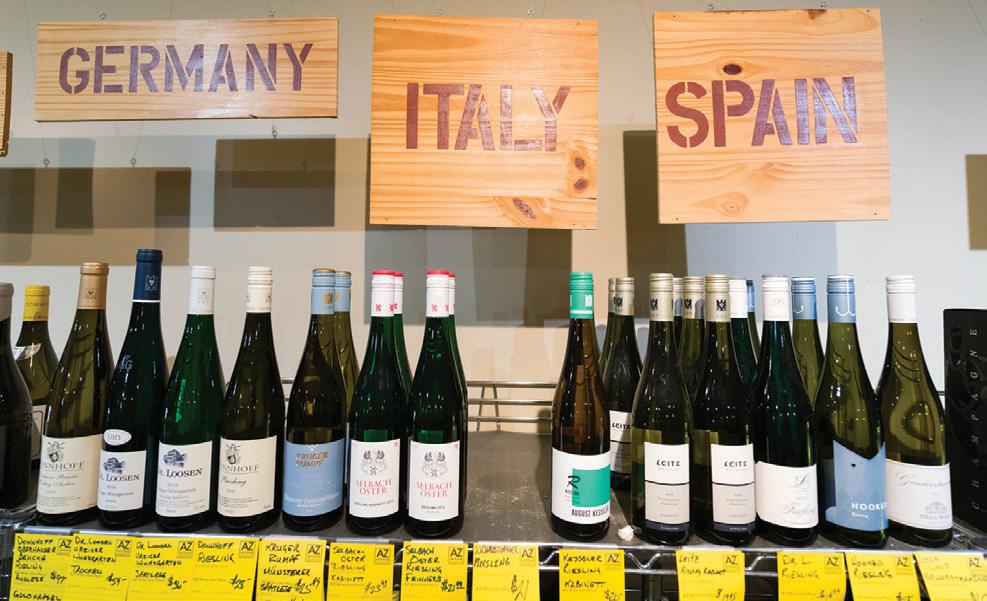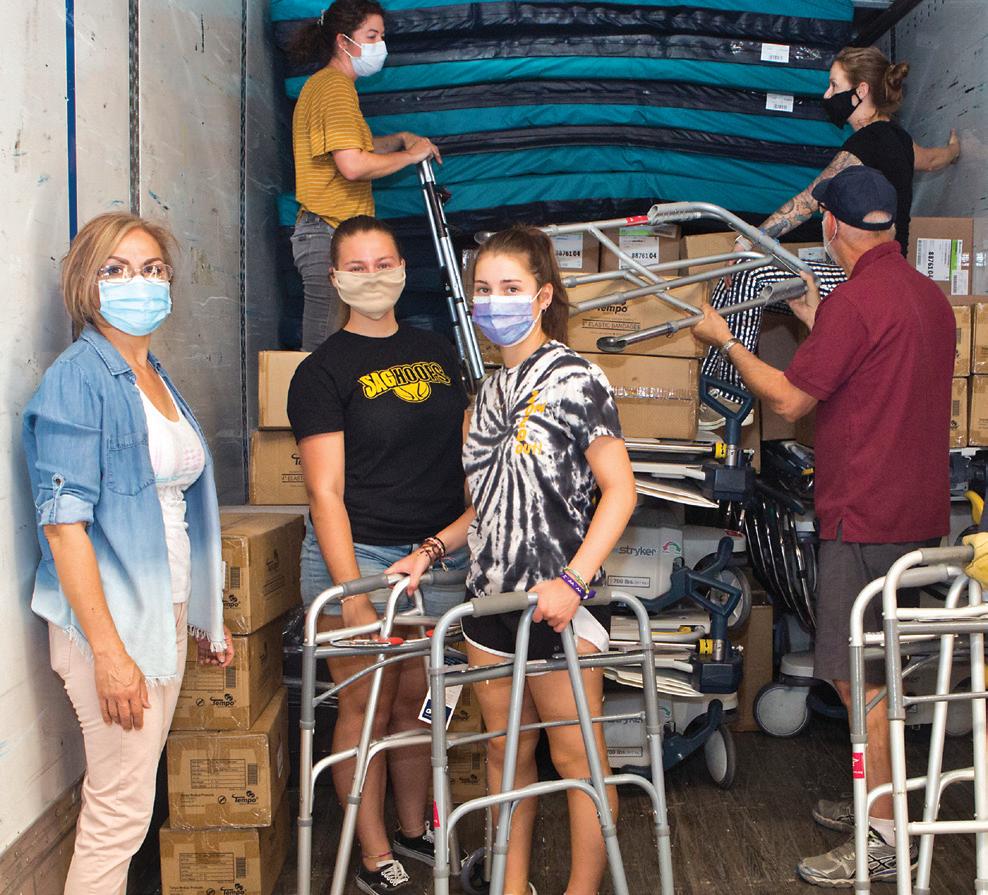
8 minute read
BUSINESS
Scottsdale.org
l @ScottsdaleProgress /ScottsdaleProgress
Tariffs threaten wine industry, experts warn
BY KRISTINE CANNON
Progress Staff Writer
The wine industry as we know it is in danger, experts fear.
Last fall, the Trump administration levied a 25 percent tariff on wine imported from France, Spain, England, and Germany – a tax that U.S.-owned importers, distributors and retailers and not European companies have to pay.
And this fall, that tariff could increase to 100 percent – prompting Ben Aneff, president of the U.S. Wine Trade Alliance and managing director of New-York based retail wine store Tribeca Wine Merchants to make a dire prediction.
Calling the prospect “the greatest threat to the wine industry since Prohibition,” Abrams warned:
“Without a doubt, if you put a 100 percent tariff on all imported wines, it would cause a staggering, cascading number of job losses across the U.S. wine industry.
Added Elizabeth Gerlach, general mancustomers were awarded major shopping sprees at its original location in Mesa recently.
Patti Everts of Scottsdale and Richard Holmes of Peoria each won $10,000 to spend at the store for being its 4 millionth transaction.
John Polainer, the Scottsdale location’s general manager, gave them certificates. He also served as the salesperson who sold Everts her appliances at the Scottsdale store.
Everts’ prize-winning trip was her first visit to Spencer’s.
Todd Sawyer is the owner of Atlas Bistro, a BYOB restaurant with an attached wine shop called Arizona Wine Company, in Scottsdale. He is just one of many wine busi ness owners impacted by the 25 percent wine tariff passed in the fall.
Progress Staff Photographer) (Pablo Robles/
ager of Chandler-based wine and spirits purveyor, Quench Fine Wines: “The entire wine industry would be at risk.”
“The impact of a 100 percent tariff would be devastating to the wine industry, resulting in loss of jobs, folding of companies and a combination of higher prices and less of a selection to consumers,” Gerlach said. Quench’s business is made up of roughly 70 percent imports, so their business would be “severely threatened,” she added.
Both Shepherd and Todd Sawyer, owner of Scottsdale wine shop AZ Wine Company – which is attached to his BYOB restaurant, Atlas Bistro – are already feeling the effects of the 25 percent tariff, including increased wine prices.
About 40 percent of the wines sold at AZ Wine Company are imported from France, Spain, England, and Germany.
“These are really key products for us. Consumers demand them,” Aneff said. “You couldn’t pick a worst time to do it, in the midst of this COVID-19 pandemic, when these companies are absolutely reeling.” During the first month since the 25 per
Two win big as Spencer’s 4 millionth customers
BY ANNIKA TOMLIN Progress Staff Writer
Two Spencer’s TV & Appliance
seeTARIFFS page 24

Scottsdale Spencer’s TV & Appliances General Manager John Polainer, center, awards the 4 millionth transaction winners Richard Holmes, left, and Patti Everts, right. (Annika Tomlin/Progress Staff)
“I bought a whole new kitchen,” Everts said gleefully. “I bought everything that a kitchen should be—a washer and dryer, refrigerator, microwave and dishwasher, the whole kitchen.”
Everts said she’s never won anything like this. At first, she thought she thought the phone call from Spencer’s was a trick.
“I received a phone call in the afternoon, and I thought I was punked; I really did,” Everts said matter of factly. “I didn’t know the person calling me. I didn’t recognize the number on my cellphone. I was trying to be excited
cent tariff was implemented, U.S. imports from France alone fell $35 million compared to the same month in 2018 — “resulting in nearly $30 million loss in profit and taxes in the U.S.,” Gerlach said.
Overall, Aneff said the tariffs on European wines are expected to cost about $10 billion in lost revenue and 78,000 job losses across the nation’s 47,000 wine retailers and more than 6,500 importers and distributors.
“There’s tremendous struggle,” Aneff said of wine businesses already in deep water due to the COVID-19 crisis. “Large numbers of U.S. distributors have laid off staff, [and] some have furloughed huge percentages of their staff – upwards of 50, 60, 70 percent.”
It’s these distributors, in particular, that would be most at risk should tariffs continue or increase.
“All these wine teams are getting destroyed, as far as the distributors,” Sawyer said. “If you couple that with a 100 percent increase in pricing, we’re going to have a serious amount of consolidation. I think all the small distributors are not going to survive this.”
For now, the 25 percent levy remains until August, when it is set for review.
Until then, Aneff encourages the public to comment on the issue in emails to the U.S. Trade Representative.
“They should tell the U.S. Trade Representative: 'Scrap the tariffs on wine products because they disproportionately harm American businesses. They should put the tariffs on products that ensure the damage stays in the EU, where it should be,'” Aneff said.
Gerlach and Sawyer also recommend writing letters to Arizona Senators Martha McSally and Kyrsten Sinema.
“All voices in opposition to wine tariffs for him, but I didn’t want to be super excited and be wrong.
“Then John (Polainer), my salesperson, calls me about an hour later and congratulated me and then I knew it was real.”
Everts is not sure how she will spend her $10,000, but she’s excited to return to Spencer’s when she is ready.
Holmes is a long-time customer of
Wines from these countries are at risk of being subjected to a huge tariff by the U.S.

this fall. (Special to the Progress)
count,” Gerlach said. “Ask them to stand up against retaliatory wine tariffs.”
Ryan Shepherd, managing partner at Phoenix-based Action Wine & Spirits, said, “The public should be concerned about any trade policy that stifles free markets, limits consumer choice, favors establishment over fledgling, and misses the intended target altogether by landing the financial impacts of said policies squarely in the laps of American businesses and American consumers.”
The 25 percent tariff originated over a dispute regarding aircraft manufacturing subsidies.
At the time, a separate 10 percent tariff was levied against Airbus, the European aircraft manufacturer that competes directly with Boeing.
“We completely appreciate the position the U.S. Trade Representative is in terms of needing to resolve this Airbus issue, but they will be significantly more successful doing so if they put the targets on the source of the problem, which is AirSpencer’s and was also surprised that he had won.
“One of the managers let me know,” Holmes said. “I was surprised and right after that the salesman called me.”
To enter into the competition, Holmes bought a new stove and refrigerator. He bought all of his appliances at Spencer’s in the last 15 years.
Holmes had also never won something to the magnitude of this prize.
“My first experience with them was
bus,” Aneff said.
Shepherd describes the impact of the tariffs as having a ripple effect.
“If we as U.S. consumers refuse purchase of these products at their new price points – and we will – other global markets will gladly absorb them, along with dissolving the decades-long relationships forged between U.S. importers and EU wineries that make it possible for us to really good and every experience since has been great so I just keep coming back,” Holmes said.
He already used most of the gift on more appliances and will finish + using the winnings and continue to be “a Spencer’s customer forever.”
“We got another new stove and another new refrigerator, and a deep freezer and a TV. Now we’re just waiting to get some more stuff,” Holmes said. have access to these historic wineries,” Shepherd said. “To many, these relationships are like family.”
This, in turn, puts hundreds of thousands of import, wholesale, retail and restaurant jobs at risk.
“These are low-margin, passion-driven professions. Tariffs in this sector aren’t sticking it to the man, and tightening the belt isn’t really an option — especially with how COVID has devastated our industry,” Shepherd continued.
Domestic wineries are then negatively affected by the tariffs on EU imports, “and wineries across the U.S., many of whom are farmers, are also dependent on a healthy, robust network of wholesalers across the country to market their products for them,” Shepherd added.
Shortly after the tax implementation, Sawyer, Gerlach and Shepherd, among other representatives from several locally based, mid-sized distributors, met with McSally and Sinema in January to raise awareness of the tariff’s impact on Arizona businesses.
“Our hope is for them to understand the negative effect the tariffs will have on our local economy and support this nonpartisan issue by carrying the message to their fellow policy makers in Washington D.C.,” Gerlach said.
McSally and Sinema can be reached at 602-952-2410 and 602-598-7327, respectively.
Or, to email them, visit their websites at mcsally.senate.gov and sinema.senate.gov.
“Quench is passionate about fine wine, and we have worked diligently for nearly two decades to curate a vibrant selection of wines to the Arizona market,” Gerlach said. “It would be a shame to forfeit that hard work because of a dispute that has nothing to
SPENCERS ���� page 23
do with our industry.”
After buying a new stove, Holmes sold his other one but now has three refrigerators and a freezer in his house.
Spencer’s has 10 Valleywide locations that are practicing social distancing during the pandemic and offers virtual listings of its appliances on its website.
Polainer was happy to award the winners and is hopeful that by next year the company will have reached the 5 millionth transaction mark.




